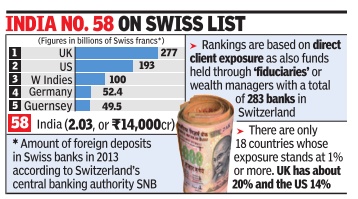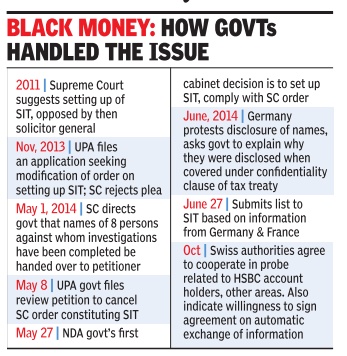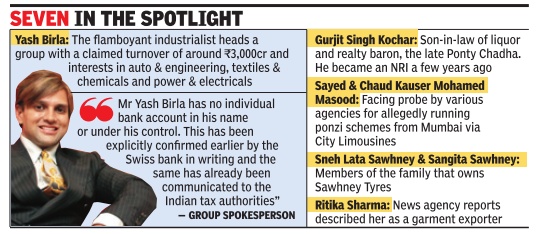Indian money in foreign banks
m (Pdewan moved page Indian money in Swiss banks to Indian money in foreign banks without leaving a redirect) |
Revision as of 10:54, 2 October 2015

This is a collection of articles archived for the excellence of their content. |
1997: voluntary disclosure of income scheme
The Times of India, Sep 25 2015
Pradeep Thakur
Over 3.5 lakh entities came clean in 1997
The government's black money and foreign assets disclosure window is just six days away from closing but until Wednesday , only 29 declarations worth a little over Rs 2,000 crore have been made, tax officials said. Officials blamed lack of clarity on some of the issues for the slow response to the compliance scheme that opened on July 1, prompting several high net worth individuals (HNIs) to wait till the last moment. The government expects declarations to gather pace in the last few days since non-disclosure will result in stiff penalties and possible jail term.
Tax authorities had issued two sets of clarifications to assure those who want to come clean. They also said secrecy of the information shared would be maintained and there would be no harassment of those who declared their details.
A senior finance ministry official, however, refused to comment. He said these declarations were highly confidential and known to only few officials and could not be shared. Just six days left to the deadline to disclose black money , but only 29 people have come forward for disclosures.
A senior finance ministry official refused to give any details, saying these declarations are highly confidential. “ It will be speculative to give any figure at this moment,“ he added.
As against the lack of takers for the current amnesty window, the last voluntary disclosure of income scheme of 1997 had overwhelming response with more than 3.5 lakh entities and individuals coming forward, resulting in a tax mopup of over Rs 10,000 crore. So, what is keeping these HNIs away from disclosure? As TOI had reported earlier, in comparison to the VDIS-1997, which was an amnesty scheme, the tax compliance window comes with penalty over tax, which together add up to 60%.
This was only 30% in 1997 for individuals and 35% for corporates.
The government has repeatedly said that the current offer is not an amnesty scheme but a window for people with undisclosed foreign assets to come clean before the tough black money law kicks in.
The government has cited the black money bill as its commitment to fight the menace. Since taking office, it has taken several measures to tackle the problem including setting up of a Special Investigation Team to probe cases of black money .
Tax treaties (multilateral, Swiss, US) and confidentiality
Black money: Switzerland reminds India of terms for sharing bank information
TNN & Agencies | Oct 31, 2014 The Times of India
Swiss double taxation agreement with India
Swiss authorities are worried about sharing information and made comments to this effect at a time when a Supreme Court-monitored SIT is probing alleged stashing of black money by Indians aboard.
In Oct 2014 Switzerland said that information exchanged with India under its tax treaty can't be disclosed "in principle" to a court or any other body outside the proceedings of a "specific and relevant" case.
Explaining the treaty provisions about disclosure of such 'secret' information, a Swiss finance ministry spokesperson told PTI from Berne that authorities from the two countries have "regular contacts on bilateral tax matters" but refused to comment on particular cases.
The exchange of information on tax matters between India and Switzerland is based on the double taxation agreement (DTA) and the protocol that was signed in 2010 between the two countries. It has been in force since October 2011. "This agreement is in line with the international standards and provides for exchange of information on request," the spokesperson said.
"Accordingly, the information exchanged under the terms of the DTA can be provided to a court in situations where it is dealing with a specific case related to tax matters for which this information is relevant. Conversely, information cannot be disclosed in principle to a court or another body outside of such proceedings," the official added. The spokesperson, however, declined to comment on "particular cases", citing the confidentiality provisions of the Swiss-Indian DTA.
There has been a heated debate on whether the disclosure of names, without prosecution, could violate tax treaties under which these names and other details are shared by foreign countries.
Replying to queries in this regard, the Swiss Federal department of finance spokesperson said the protocol to Swiss-Indian Double Taxation Agreement states that any information received "by a contracting state shall be treated as 'secret' in the same manner as information obtained under the domestic laws of that state..."
The treaty further provides that any such information "shall be disclosed only to persons or authorities (including courts and administrative bodies) concerned with the assessment or collection of (information), the enforcement or prosecution in respect of, or the determination of appeals in relation to the taxes ... or the oversight of the above."
The Swiss finance ministry spokesperson further said the treaty states that "such persons or authorities shall use the information 'only' for such purposes. They may disclose the information in public court proceedings or in judicial decisions".
Multilateral Competent Authority Agreement
This Swiss clarification came a day after the government was ordered by the Supreme Court to hand over all the 627 names of Indian account holders in HSBC Bank, Geneva, forcing the government to opt out from the signing of an international treaty on exchange of financial information.
Officials in India said that all countries which have legally shared information with India have done so under treaties, which contain a confidentiality clause. "That's the way business is done internationally. We have to follow the same practice," an official said.
India's last minute withdrawal from the Multilateral Competent Authority Agreement — which provides for automatic information exchange, starting 2017 — is bound to choke the flow of vital data to tax authorities and hinder attempts to act against unaccounted funds parked in overseas accounts. India can still sign the pact. Currently, it is awaiting clarity from the court.
Inter-Governmental Agreement with the US
The source pointed out that India also has to sign the Inter-Governmental Agreement with the US for automatic exchange of information, which also comes with a confidentiality clause. Officials said that in case of a delay beyond December 31, 2014 all remittances from the US will face a 30% withholding tax.
"For signing the agreement, the government has to give a commitment that it will follow international standards for the information received. But we could not give an assurance due to Supreme Court's interpretation of confidentiality, which is critical for all governments to exchange information," said a government official.
2012: sharp decline in Indian deposits
At 9,000cr, Indian money in Swiss a/cs at record low
Zurich/New Delhi: Indians’ money in Swiss banks has fallen to a record low level of about Rs 9,000 crore (1.42 billion Swiss francs), as a global clampdown against the famed wall of secrecy of the Switzerland banking system made it unattractive for their international clients.
The total funds held by Indian individuals and entities included 1.34 billion Swiss francs held directly by Indian individuals and entities and another 77 million Swiss francs through ‘fiduciaries’ or wealth managers at the end of 2012, as per the latest figures released by the Swiss National Bank (SNB) in Zurich.
The official data, which forms part of SNB’s annual report on Swiss banks, further showed that the Indians’ money there fell by about 35% or Rs 4,900 crore in 2012. This was much steeper than a 9.1% fall in the funds held by entities from across the world in Swiss banks, which also hit an all-time low of 1.4 trillion Swiss francs ($1.5 trillion) at the end of 2012. PTI
2012: The relative ranks of China, India and Pakistan
Swiss money: India slips to 70th position; UK on top Sri Lanka Swiss banks PTI | Jun 23, 2013,
The latest official data released by Switzerland's central bank shows that the money they owed to Indian clients at the end of 2012 was 1.42 billion Swiss francs (about Rs 9,000 crore).
ZURICH/ NEW DELHI: India has slipped to 70th position in terms of foreign money lying with the Swiss banks and accounts for a meagre 0.10 per cent of total global wealth held in the Switzerland banking system.
While the UK continues to account for the largest chunk of such funds, India has now slipped lower to 70th position -- the lowest rank among all major economies of the world, shows an analysis of annual data released by Swiss National Bank (SNB) on all the banks present in the European country. India was ranked 55th for such funds a year ago with a total amount of 2.18 billion Swiss francs belonging to the Indian individuals. Among the top-ten jurisdictions in terms of source of money with Swiss banks, the UK is now followed by the US, West Indies, Jersey, Guernsey, Germany, France, Bahamas, Cayman Islands and Hong Kong.
The major countries ranked among the top-25 include include Singapore, Japan, Italy, Australia, Russia, Netherlands, Saudi Arabia and Cyprus. Besides, China was ranked 26th, Canada 28th, Brazil at 39th and South Africa at 50th. India's neighbouring country Pakistan was also ranked one place higher at 69th, although countries like Mauritius, and Sri Lanka are positioned below India.
2013: Rise in Indian deposits
Indian money in Swiss banks rises to over Rs 14,000 crore
PTI | Jun 19, 2014
ZURICH/NEW DELH: Indians' money in Swiss banks has risen to over two billion Swiss francs (nearly Rs 14,000 crore), despite a global clampdown against the famed secrecy wall of Switzerland banking system.
The funds held by Indians with banks in Switzerland rose by over 40% during 2013, from about 1.42 billion Swiss francs at the end of previous year, as per the latest data released today by the country's central banking authority Swiss National Bank (SNB).
In contrast, the money held in Swiss banks by their foreign clients from across the world continued to decline and stood at a record low of 1.32 trillion Swiss francs (about $1.56 trillion or over Rs 90 lakh crore) at the end of 2013.
During 2012, the Indians' money in Swiss banks had fallen by over one-third to a record low level.
The total Indian money held in Swiss banks included 1.95 billion Swiss francs held directly by Indian individuals and entities, and another 77.3 million Swiss francs through 'fiduciaries' or wealth managers at the end of 2013.
India has constituted a Special Investigation Team (SIT) to probe cases of alleged black money of Indians, including funds stashed abroad in places like Switzerland.
The funds, described by SNB as 'liabilities' of Swiss banks or 'amounts due to' their clients, are the official figures disclosed by the Swiss authorities and do not indicate towards the quantum of the much-debated alleged black money held by Indians in the safe havens of Switzerland.
SNB's official figures also do not include the money that Indians or others might have in Swiss banks in the names of entities from different countries.
There are a total of 283 banks in Switzerland, down from nearly 300 at the beginning of 2013. This include two banks (UBS and Credit Suisse) classified as big banks, while there are 93 foreign-controlled banks operating in the country. A total of close to 1.25 lakh staff work at these banks.
With regard to the money held by Indians in Swiss banks, it rose during 2013 after a sharp decline in 2012. Prior to that, Indian money in Swiss banks had risen during 2011 also.
The quantum of Indian funds in Swiss banks stood at a record high level of 6.5 billion Swiss francs at the end of 2006, but it declined by more than 4 billion Swiss francs after four straight years of fall till 2010.
Most Indian deposits are with UBS and Credit Suisse
Two big banks have 2/3rd of all Swiss money of Indians
PTI | Jun 20, 2014 The Times of India
It is just two big banks — UBS and Credit Suisse — which appear to be accounting for almost two-third of the total money held by Indians in Swiss banking system, known for their famed secrecy walls.
According to the latest official data disclosed by Switzerland's central banking authority Swiss National Bank (SNB), Indians' money in Swiss banks rose by 43 per cent last year to 2.03 billion Swiss francs (nearly Rs 14,000 crore), despite growing global pressure on Switzerland to share client details of their banks.
A further analysis of SNB data shows that the "big banks" account for 68.2 per cent or about 1.4 billion Swiss francs (close to Rs 10,000 crore) of the total money belonging to the Indian clients of Swiss banks.
There are a total of 283 banks in Switzerland, out of which only two — UBS and Credit Suisse — have been classified as 'big banks' by Zurich-based SNB. There are also 93 foreign-controlled banks operating in the country.
However, the amount held by Indian clients in "savings and deposit accounts" of Swiss banks is comparatively less at about 63 million Swiss francs (less than Rs 500 crore) and account for just about three per cent of the total exposure of Indians to the Swiss banking system.
Swiss banks classify a major portion of their clients' money as "other amounts due to customers" and such funds due to their Indian clients stand at nearly 1.6 billion Swiss francs (over Rs 11,000 crore).
The "other" avenues through which clients park their funds with Swiss banks include "trading portfolios, financial investments and participating interests". Besides, banks are also said to be promoting "precious metals" among their clients for parking their funds.
A small portion of clients' money is also held by Swiss banks through other banks in the foreign countries. For Indian clients, such funds stood at about 94 million Swiss francs (about Rs 650 crore) at the end of 2013.
The total Indian money held in Swiss banks include 1.95 billion Swiss francs held directly by Indian individuals and entities, and another 77.3 million Swiss francs through 'fiduciaries' or wealth managers at the end of 2013.
The funds, described by SNB as "liabilities" of Swiss banks or 'amounts due to' their their clients, are the official figures disclosed by the Swiss authorities and do not indicate towards the quantum of the much-debated alleged black money held by Indians in the safe havens of Switzerland.
2014: The names of some Indian account holders
Govt starts disclosing foreign ac holders with 3 names
Dhananjay Mahapatra The Times of India Oct 28 2014
No Politicians In First List
After hinting at the involvement of top politicians in the black money case, the Centre on Monday revealed three business names –
Dabur's Pradip Burman,
bullion trader Pankaj Chimanlal Lodhiya and
Goa's Timblo Pvt Ltd.
It was the French authorities who informed India about Burman's alleged tax evasion and stashing of money abroad. Information about the other two -Lodhiya and Timblo Pvt Ltd -came from the German authorities. Timblo Pvt Ltd faces prosecution along with its directors Rad ha S Timblo, Chetan S Timblo, Rohan S Timblo, Anna C Timblo and Mallika R Timblo. The names of alleged black money account holders were revealed by the Centre before the Supreme Court in an affidavit filed 24 hours before the scheduled hearing in the case. It said: “Several more cases are under process and the names of persons prosecuted will become public in due course.“
But the Centre's commitment to reveal names came with a caveat.
“Government is committed to disclose names of persons holding illegal money abroad. However, every account held by an Indian in a foreign country may not be illegal and the fundamental right of citizens to privacy under Article 21 of the Constitution cannot be ignored,“ said the affidavit mentioned by attorney general Mukul Rohatgi before a bench headed by Chief Justice H L Dattu.
The Centre said double taxation avoidance agreements (DTAAs) and similar treaties with other countries are vital sources of information on Indians stashing ill-gotten money in foreign banks and that the agreements and treaties mandate that information provided under these could be revealed only after court proceedings were initiated against them on completion of a proper investigation about the financial illegality committed by the person.
It told the SC, “Names of persons found to have stashed illegal money abroad, as also information and documents received from foreign countries relating to off-shore tax evasion and avoidance will be dis closed after following the procedure prescribed in the legal instruments through which the information has been received.“ The German authorities had provided names of 12 trustsentities involving 26 Indians who had accounts with LGT Bank in Liechtenstein. The government after completion of investigation concluded that 18 cases merited investigation. The names of the 18 were revealed to the court and petitioner Ram Jethmalani.
But, it contested the SC's May 1 order directing the Centre to reveal the names of the other eight where no illegality was found. Revealing their names would not only breach bilateral agreements but also send a wrong signal to other countries with which India was on the verge of signing DTAAs, which it termed as an important means to get information on black money deposited in foreign banks.
The Centre said: “India is on the verge of entering into bilateral and multilateral agreements for automatic exchange of information that will greatly help in our fight against black money stashed in financial accounts and assets maintained overseas by Indian tax payers.“
Efforts to obtain information about undisclosed money held by Indians abroad also include entering into new treaties and agreements as per the new global standards on automatic exchange of information.
2015: ICIJ/ Indian Express' list of HSBC a/c's
Indian money in HSBC, Switzerland
Neo Corp International Ltd, Indore
The Times of India, Sep 09 2015
Black money: Swiss govt reveals name of MP firm
In a fresh disclosure on black money cases being probed by Indian tax authorities , Switzerland said it has received a request for information on Indore-based textiles firm Neo Corp International Ltd. Neo Corp, which began as a small woven sack maker in 1985, had faced income tax searches on its various premises in February .
In Indore, I-T commissioner, Prashant Jha told TOI, “We conducted raids at Neo Corp in February and after that a request was sent to Switzerland government to get details on financial transaction of the company .“ “We recovered some Global Deposit Receipt (GDR) of the company in which they claimed to raise funds for investing in the company . All details of financial transaction were mentioned on their balance sheet and they shared this information with RBI as well,“ said Jha.
Chairman and managing director of Neo Corp, Sunil Trivedi said, “ An official account of our company was opened in Investec Bank of Switzer land in 2011-12 to raise capital. But incidentally this account was not used and another account in a bank in Singapore was used for raising funds. No transaction was done through bank account in Switzer land, which was closed in 2015.“
“It is part of standard procedure in which requests are sent to get details verified from respective countries. We raised Rs 104 crore from the international market for investing in the company and we informed RBI about it,“ he said.
Yash Birla, Gurjit Singh Kochar, Sayed and Chaud Kauser Mohamed Masood, Sneh Lata Sawhney and Sangita Sawhney and Ritika Sharma
The Times of India, May 27 2015
Pradeep Thakur
Yash Birla in fresh list of Indian bank account holders disclosed by Swiss
Swiss tax authorities have disclosed more names of Indians having accounts in their jurisdiction, marking a success for the government's efforts to persuade them to share information on at least those against whom the income tax department has collected credible evidence of non-reporting. A day after two names -Sneh Lata Sawhney and Sangita Sawhney , linked to the own ers of Sawhney Tyres -were disclosed, more identities of Swiss account holders from India became public. These included industrialist Yash Birla, Sayed Mohamed Masood and Chand Kauser Mohamed Masood, Gurjit Singh Kochar and Ritika Sharma. The Mumbai-based Masoods are facing various investigations for their alleged involvement in what is known as the City Limousine scam. Kochar, an NRI, is the son-in-law of the late Ponty Chadha, a real estate, sugar and liquor tycoon. Swiss tax authorities told TOI that the names were disclosed because the individuals concerned had not provided valid addresses. They did not rule out putting out more Indian names. A spokesperson of the Swiss Federal Tax Authority emphasized that account details of those whose names have been disclosed would be shared with the India if the individuals did not respond or appeal within 10 days.
The spokesperson said in an email to TOI, “The names published in the Swiss Federal Gazette about Indians are exceptional cases where we don't have valid addresses and these people could not be informed... It is an opportunity to respond before information is shared with India.They are not necessarily cases of tax evasion... (it is) difficult to say how many names will be published in the gazette.“
Indian authorities celebrated the development, seen as a breakthrough after sustained efforts to persuade the Swiss to breach what finance minister Arun Jaitley said was their “banking secrecy“.Politically, the disclosures could not have been timed better, coming on the first anniversary of the Modi government, which was under pressure for not redeeming its pledge to recover black money . Jaitley told reporters that the cooperation fructifying around the NDA 's anniversary made him even happier.
Sources said while the Sawhneys were among those on the list of account holders in HSBC's Geneva branch, the Swiss had stonewalled India's requests for information on them. They had argued that the HSBC list was based on “stolen“ data and Swiss law barred them from making it public. It was after three rounds of discussions -including two at the level of the Indian finance minister -that they agreed to act in cases where the government submitted evidence against individuals. Sources said the disclosure about the Sawhneys followed submission of evi dence gathered during I-T searches on their premises.
Considering that the I-T department has launched prosecution in 121 cases linked to the HSBC list, more disclosures are likely . The cases of the Masoods and Kochar show that Swiss help has stretched beyond the HSBC list. Data on them was provided on the basis of I-T probe.
See also
Indian money in Swiss banks Indian money in Liechtenstein banks Sri Lankan money in Swiss banks



